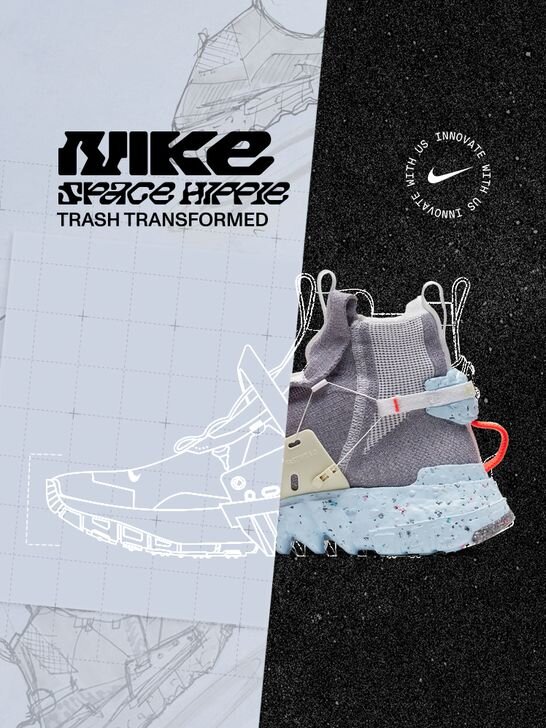NIKE Space Hippie Is Coming To Earth
Photo courtesy of NIKE
Written by Jessy Humann
It’s no secret that there’s too much plastic waste on the planet. As plastic piles up in landfills and makes its way into oceans, people continue to look for solutions to the problem. Cutting down on plastic use is one option, but this won’t completely solve the problem. The fact is that plastic will continue to be used for decades to come, so innovative solutions to reducing plastic waste will always be needed.
Photo courtesy of NIKE
Many companies have found ways to use recycled plastic to create shoes, clothing, and accessories. When well known and large-scale companies do this, they set new industry standards for smaller companies.
Nike is one of the largest shoe companies in the world, and they’re focusing on creating sustainable products in a new way, which will no doubt set new industry standards. Since 2010, Nike has saved more than 7 billion plastic bottles from landfills. All Nike Air soles contain at least 50% recycled manufacturing waste, and are made with 100% renewable energy. Since launching Flyknit, Nike has diverted 10 million pounds of waste and over 600 million water bottles from landfills.
Photo courtesy of NIKE
The new Space Hippie sneakers from Nike will be made from at least 85% rPoly, made from recycled yarn scraps, T-shirts, and plastic water bottles. The line is inspired by life on Mars, where all materials would have to be recycled. Nike reduces their carbon emissions 30% by making sneakers from recycled plastic bottles and recycled polyester. By 2020, they hope to use 100% certified organic, recycled, and Better Cotton Initiative (BCI) licensed cotton for all of their products. This will dramatically improve their mission to be as sustainable as possible.
Nike is even taking initiative to promote the idea of recycling sneakers after they’ve lost their life, and they encourage consumers to recycle their sneakers. Sneakers can be dropped off at select locations, where they’re then picked up by Nike and used to make Nike Grind material, which is used to make performance products and sport surfaces. It’s a great start toward creating a closed loop system.
Photo courtesy of NIKE
When consumers see large companies like Nike making shoes and goods from recycled or renewable materials, they start to think differently about their purchases. Will all or most of the sneakers created in the future be made from fully recycled and recyclable materials because of the efforts of larger companies? As hard as it is to admit sometimes, influential companies like Nike set trends for the rest of the industry, and Nike’s trend toward sustainability is certainly a positive one.
Photo courtesy of NIKE
The shoe industry isn’t the only outlet for the reuse of plastic though. Clothing from upcycled plastic is popping up more frequently, and so are things like bracelets or sunglasses made from plastic salvaged from the ocean. The problem with wearable items is that even clothing made from recycled plastic sheds microfibers when washed. Solutions to this problem are trying to be solved with things like the Guppyfriend Washing Bag, but some would argue that this isn’t enough. Is the only solution to make and buy items that are made from natural fibers like hemp, organic cotton, or wool?
Photo courtesy of NIKE
Some people argue that recycled plastics have no place in the fashion industry. Shoes, clothes, and accessories don’t last long in comparison to recycled plastic that’s turned into something like bricks used for housing or roads. Long-term solutions for recycled plastic are certainly more ideal, but does this mean that the work companies like Nike do to upcycle materials should be discounted? Compared to clothing, sneakers are a more long-term use of recycled plastics. It’s all about perspective.
Ultimately, it’s up to the consumer to decide what’s right for them. What’s suitable for one person might not be for another, but there’s enough diversity in the world of sustainable fashion to meet a lot of people’s needs. As technology advances, new ways to deal with plastic waste will continue to pop up. What’s important is a collective focus on creating a better planet.
COMMENT OR TAKE OUR PAGE READER SURVEY
Featured













Planning a successful event requires attention to every detail, from décor and layout to lighting and guest flow.